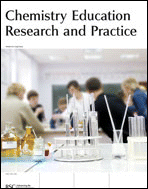Inaccuracy of self-evaluation as additional variable for prediction of students at risk of failing first-year chemistry
Abstract
Early identification of students at risk of failing first-year chemistry allows timely intervention. Cognitive factors alone are insufficient predictors for success; however, non-cognitive factors are usually difficult to measure. We have explored the use of demographic and performance variables, as well as the accuracy of self-evaluation as an indicator of metacognitive ability, as possible indicators for students at risk of failing the first semester course in General Chemistry (CMY 117) at the University of Pretoria. Variables with a strong correlation with performance in CMY 117 were used to develop a prediction model based on logistic regression. Three variables, i.e. prior performance in mathematics and in physical science, and the extent of overconfidence expressed as the ratio between expected and actual performance in a chemistry pre-test written at the start of the semester, were shown to be significant predictors for risk of failing. The highest overall accuracy of prediction (76%) was obtained for a subset of students with a C or D grade for their high school leaving examination in mathematics when high risk students were defined as those with a final mark for CMY 117 as 51% or lower. The prediction model, based on the model building data set, had a sensitivity of 92% and a specificity of 46%; whilst the sensitivity and specificity using the validation data set were 88% and 38% respectively.

 Please wait while we load your content...
Please wait while we load your content...